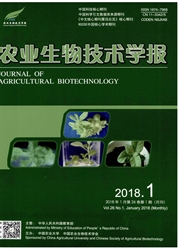

 中文摘要:
中文摘要:
来自6窝健康、体重相近的杜长大哺乳仔猪34头随机地分为两组,分别于断奶后饲喂基础日粮或基础日粮+甘露寡糖(MOS),收集仔猪断奶当天(实验前)及断奶后7、14、21和28d粪样,利用PCR/DGGE技术对粪样细菌J6SrDNA的V6-V8可变区进行了分析,以研究日粮中添加MOS对断奶仔猪粪样菌群稳定性及多样性的影响。结果表明,断奶前同窝仔猪带谱相似性较高(81%-88%),但存在个体差异;断奶后同窝仔猪的相似性下降(61%~70%);断奶后7、14、21和28d相邻时间段之间,基础日粮组仔猪菌群相似性维持在61%左右,MOS组菌群相似性在断奶第一周下降后,逐渐增加至70%,说明断奶可引起菌群发生变化,而MOS具有使菌群快速稳定的作用。多样性结果显示,断奶7d后MOS组菌群多样性增加,基础日粮组下降,14d后两组的差异增加,28d时基础日粮组多样性为1.52,MOS组为1.38,差异由断奶当天的0.09上升至28d的1.14,但差异不显著(P)H0.05);条带数分析获得类似结果,即断奶7d时两组条带数均减少,14d后MOS组条带数增加,对照组的条带数却减少,实验期内MOS组条带数均高于对照组。结果提示,断奶导致了菌群的变化,日粮中添加MOS可加速菌群多样和稳定。
 英文摘要:
英文摘要:
A total of 34 weaning piglets from six litters were randomly assigned into two groups, offered basal diet (control) and basal diet plus manno-oligosaccharide (MOS), respectively. Faecal samples were collected on day 1 (before first feeding), 7, 14, 21 and 28 after weaning. DNA was extracted from the faecal samples and the V6-V8 regions of bacterial 16S rDNA were amplified. Ampli- cons were analyzed by DGGE to investigate the diversity of the bacterial communities of weaning piglets. Results showed that piglets from the same litter had a higher similarity(81%-88%) of the bacterial community on day 1 (before weaning) compared with that after weaning (61%-70%). DGGE similarities of microbial community between neighboring time points, e.g. 1-7, 7-14, 14-21 and 21-28, decreased during the first week for all piglets, but the value in the control remained around 61%, while those in the MOS treatment gradually increased to 70%. Diversity analysis showed that after 7 days the value for the MOS treatment increased while that for the control decreased. On day 28 the diversity index of the bacterial community from the MOS diet was 1.52 and the control group was 1.38. The differences of the diversity between the two groups increased from 0.09 on day 1 to 1.14 on day 28. In agreement with diversity data, DGGE band numbers revealed that during the first week of weaning the average band numbers reduced for both groups. However, after 14 days average band number for piglets fed the MOS diet increased, while that from piglets fed the control diet decreased. The results demonstrated that weaning had caused rapid changes of the bacterial community of piglets and that MOS supplemerited in the diet could result in a rapid development and consequently early establishment of a high diverse bacterial community after weaning.
 同期刊论文项目
同期刊论文项目
 同项目期刊论文
同项目期刊论文
 期刊信息
期刊信息
